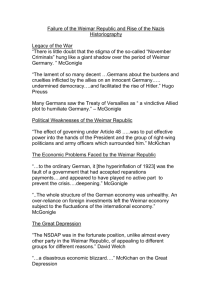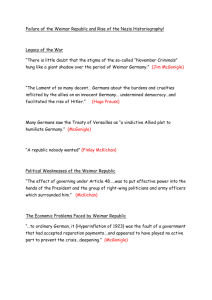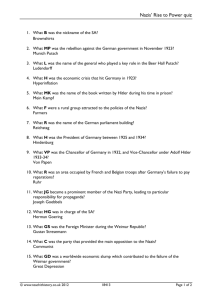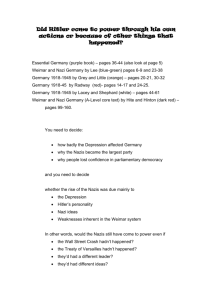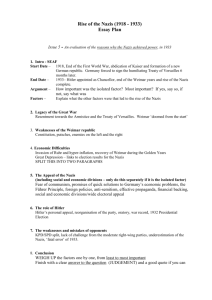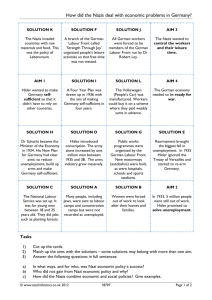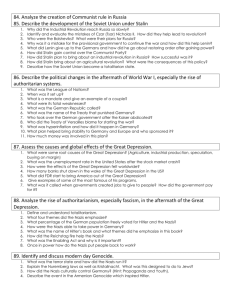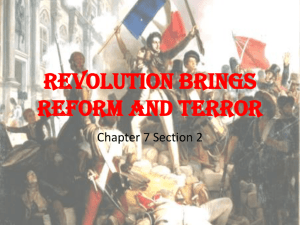Higher History Historiography Summaries
advertisement
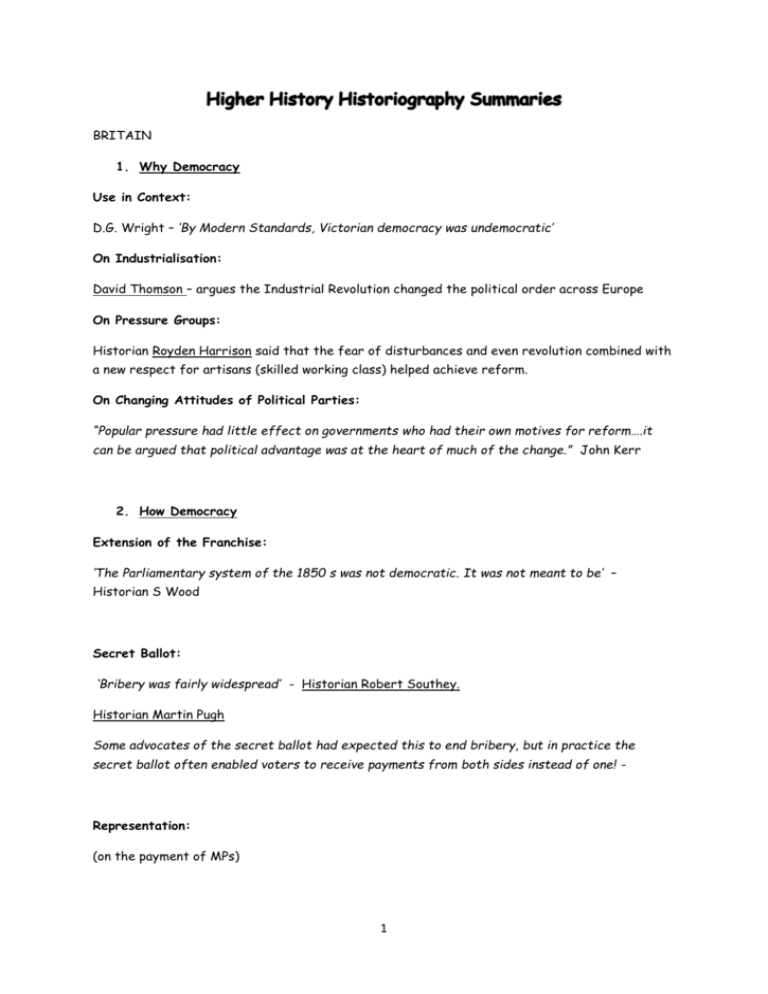
BRITAIN
1. Why Democracy
Use in Context:
D.G. Wright – ‘By Modern Standards, Victorian democracy was undemocratic’
On Industrialisation:
David Thomson – argues the Industrial Revolution changed the political order across Europe
On Pressure Groups:
Historian Royden Harrison said that the fear of disturbances and even revolution combined with
a new respect for artisans (skilled working class) helped achieve reform.
On Changing Attitudes of Political Parties:
“Popular pressure had little effect on governments who had their own motives for reform….it
can be argued that political advantage was at the heart of much of the change.” John Kerr
2. How Democracy
Extension of the Franchise:
‘The Parliamentary system of the 1850 s was not democratic. It was not meant to be’ –
Historian S Wood
Secret Ballot:
‘Bribery was fairly widespread’ - Historian Robert Southey.
Historian Martin Pugh
Some advocates of the secret ballot had expected this to end bribery, but in practice the
secret ballot often enabled voters to receive payments from both sides instead of one! -
Representation:
(on the payment of MPs)
1
‘ an MP who does his duty to his constituents has very little time for anything else’ – Prime
Minister William Gladstone on why MPs should be paid
On the reduction of House of Lords’ power
When the Parliament Act of 1911 was introduced, ‘the power of the aristocracy was ended.’ –
Prime Minister David Lloyd George
3. Women & the Vote
Professor Yeo – argues that womens’ dissatisfaction with being excluded from mainstream
politics pre WWI led to the formation of suffrage societies
ARTHUR MARWICK
•
Marwick says early changes and suffrage societies less important as they had not
achieved vote for women by 1914.
•
Marwick states war accelerated changing attitudes and let politicians off the hook as
could be seen as rewarding “heroines” rather than giving into Suffragette violence.
MARTIN PUGH
•
Pugh –says changes to women’s lives pre-1914 very important as made women more
“fitting” to vote.
•
Pugh says Suffragists most important due to respect of public, support of many MPs and
Conciliation Bills.
•
“…it has been claimed that women’s valuable work for the war effort radically changed
male ideas (about women)… seems simplistic and erroneous.”
PAULA BARTLEY
•
Bartley: supports idea of pre-war changes being important as empowered women to
demand vote e.g. working with political parties.
•
Bartley thinks Suffragettes most important as put “cause” on front page as well as
sympathy and support over force feeding.
•
“It would be naïve to believe that women received the vote solely for services rendered
in the First World War”.
•
“The significance of women’s war work in the achievement of the vote is therefore
perhaps not as great as first assumed.”
2
4. Liberal Motives
To support Booth/ Rowntree Surveys:
Kerr & McGonigle argue that the surveys gave birth to this idea of the ‘deserving poor’ who
needed help and this idea began to take root in Britain
Boer War (National Efficiency):
Kerr & McGonigle argue that the government became alarmed at the great amount of volunteers
rejected from the war and made the government question Britain’s ability to win future wars
To support New Liberalism:
C. Cross
“Two men, for politicians young men, Winston Churchill and David Lloyd George were responsible
for reviving the Liberal Government and for launching a great social programme which laid the
foundations of the future”
Arguing that Churchill and L. George were responsible for pushing forward Liberal Reforms
Kerr & McGonigle argue that when L George and Churchill were appointed, a ‘flood of social
reforms were put into place’
5. Liberal Successes
Positive:
Historian Peter Clarke:
Clarke has argued that the way the Liberals introduced their reforms was very skillful for they
bypassed the poor law and the reforms won popular approval from the people
Negatives:
A J P Taylor, on the limitations of the reforms :
“Expenditure on the social services had roughly doubled since the Liberals took office. The
state acted only to help those who could not help themselves. It left the adult citizen alone.”
3
He is arguing that the reforms cost a great deal of money and targeted only the most vulnerable
in society rather than the majority of those who needed help
M Pugh, on the Liberals aims:
“The Liberal measures were not intended as a comprehensive or uniform system of welfare
provision”
“The Edwardian Reforms were by no means a welfare state” - Pugh argues the Liberals did not
want to create a welfare state
GERMANY
1. Growth of German Nationalism
To support Cultural factors:
•
Fichte – ‘Those who speak the same language are joined to each other by invisible bonds’
•
Golo Mann - ‘most Germans seldom looked up from the plough’ (arguing that cultural
factors were not important to majority of working class Germans)
•
Andrina Stiles – ‘even in 1815 there were tens of thousands of people…who felt
passionately that Germans deserved to have a Fatherland’
•
Andrina Stiles – ‘Nationalism remained largely middle class before 1848’
To support economic factors:
•
Ian Mitchell – argues the customs & taxes in German states had held back nationalism
•
William Carr (on the Zollverein) ‘the mighty lever of German unification’
•
Andrina Stiles – ‘The Zollverein was a force for unity in the 1840s’
•
David Thomson – argues the Industrial Revolution changed the political order across
Europe
2. Rise of the Nazis
“There is little doubt that the stigma of the so-called “November Criminals” hung like a giant
shadow over the period of Weimar Germany.” (Jim McGonigle)
4
Many Germans saw the Treaty of Versailles as “a vindictive Allied plot to humiliate Germany.”
(McGonigle)
“A republic nobody wanted” (Finlay McKichan)
“…to ordinary German, it {Hyperinflation of 1923} was the fault of a government that had
accepted reparation payments….and appeared to have played no active part to prevent the
crisis…deepening.” (McGonigle)
“.. a disastrous economic blizzard…” (McKichan) on the Great Depression
“Hitler would almost certainly have remained on the fringes of politics had it not been for the
Great Depression…and the hardship if brought.” (McKichan)
“There is no doubt the Germany suffered much more than Britain and France during this period
and Hitler exploited this misery to the full.” (McGonigle)
“Only the Great Depression put the wind in the Nazi’s sails” (AJP Taylor)
“{Goebbels’s} brilliant propaganda techniques played a large part in exploiting the Depression to
win mass support...” (McKichan)
“The NSDAP was the fortunate position, unlike almost every other party in the Weimar
Republic, of appealing to different reasons.” (David Welsh)
The crushing of the Spartacist revolt “destroyed any hope of cooperation between the
different wings of the socialist groups…” (McGonigle)
“Hitler was their greatest electoral asset”. (Cameron, Robertson and Henderson)
5
3. Nazis in Power
To Support Consent and Popularity:
Martin Broszat
Argues that Nazis couldn’t have maintained power without widespread support for their policies
“The German people who opposed democracy and wanted a restoration of conservative and
authoritarian principles helped put Hitler in power and fostered the growth of his cult-like
image”.
Robert Gellately
Thinks that it was impossible for the Nazis, especially the Gestapo, to control Germany without
widespread support. This suggests that consent and popularity was an important reason for the
Nazis staying in power.
Also believes that the Nazi propaganda machine was an important reason why the Nazis
maintained power.
Ian Kershaw
“For almost a decade after 1933, Hitler enjoyed a remarkable degree of popularity among the
great majority of the German people”
David Welch
Welch believes that the regime largely won over the working class through programs such as
Strength Through Joy (KDF) which provided entertainment and travel opportunities.
To support Terror and Force:
Detlev J. K. Peukert
Thinks that Nazis kept control over Germany because the working class were too afraid to take
on the Gestapo and SS.
He believes that the working class as a whole may have offered some small measure of token
resistance, but because of the Nazi terror apparatus, could not organise in any significant way.
6
David Welch
argues that propaganda in Nazi Germany (particularly promoting KDF and other schemes) was
largely successful – at least to the extent that it tended to limit opposition to the regime.
7
